Space is way, way big. Bigger than you can imagine. Compared to the size of the Milky Way (which is only our local galaxy, one of 225 billion), even very fast ships are likely to be comparatively slow. Among the options open to travellers who do not want to invest large fractions of their conscious lives getting from A to B: hibernation. Given the correct technology, travellers can just take a chill pill and sleep the dark light years away.1
How well this works in practice depends on a number of factors, such as the degree to which metabolism is slowed in hibernation, the frequency of lost luggage scenarios involving sleepers, and of course, the need by authors for dramatic scenarios. Consider these five works featuring hibernation.
The Winds of Gath by E. C. Tubb (1967)
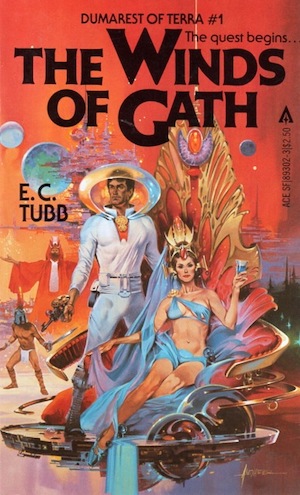
Determined to find his lost home world, Dumarest of Earth travels from world to world. Itinerate labourers like Dumarest must travel by the cheapest method available: cold sleep, AKA “Low Passage.” True, the odds of waking from Low Passage are only five in six, assuming the traveller is well-fed and healthy, but it is a risk Dumarest and his companions accept.
Surviving yet another gamble with Low, Dumarest is confronted by yet another Low reality: there is no protection or warning for the traveller should the starship captain alter destination in flight. Rather than waking on prosperous Broome, Dumarest is stuck on tide-locked Gath. Gath is not prosperous and escape may prove quite difficult. If escape is possible at all.
***
Traveller by Marc Miller (1977)
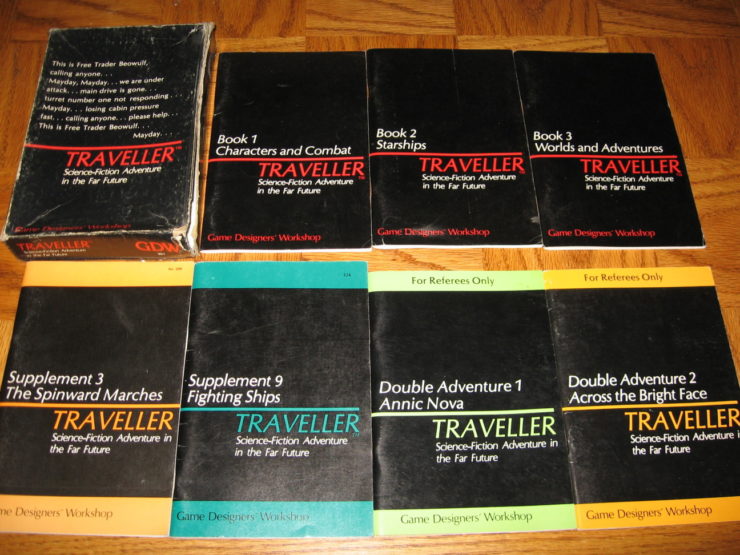
Not a novel (though there’s a game manual, not to mention abundant support material), but an SF roleplaying game. Traveller drew on many works, one of which was E. C. Tubb’s Dumarest of Terra series (with which readers may be familiar with from the previous entry, if not from having read any Dumarest novels). Many player characters were given a retirement benefit that included tickets entitling them to one or more Low Passage trips. These trips, true to their Dumarest inspiration, were both inexpensive and had a one in six change of killing the passenger.
Dumarest, of course, was the protagonist of a long running series and thus protected by Tubb’s need to keep his lead alive. This was not true for Traveller characters—unsurprising for an RPG where characters could die while being generated.
This may explain why it is I don’t recall any player character in any of the campaigns I was in ever actually using their Low Passages. I do recall the lengthy campaign in which our increasingly depressed ship’s doctor failed to revive any of the ship’s non-player character Low passengers.
One wonders about the mindset of a company offering retirement benefits that have the same odds of killing the retiree as does Russian roulette…
***
The Songs of Distant Earth by Arthur C. Clarke
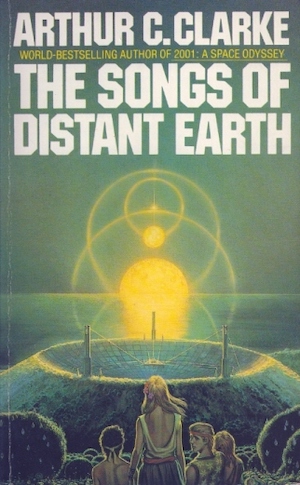
Faced with certain doom in the form of an impending nova and lacking any practical means of sending people to other star systems, humanity did what it always does. It found a practical solution using the means at hand—in this case dispatching seedships to gestate colonists at the destination—before awaiting their demise with the dispassionate calm and grace characteristic of humans keenly aware of impending mortality.
Some centuries later, the colony world Thalassa is astounded to learn their cousins on Earth did not settle for inevitable death. At very nearly the last moment, Earth cracked the problem of zero-point energy. ZPE-powered starships coupled with cold sleep meant legions of Terrestrials could be dispatched to non-exploding star systems. A mishap en route forces the starship Magellan to make an unscheduled stop at Thalassa. What will Terrestrials and Thalassans make of each other?
***
An Oath of Dogs by Wendy N. Wagner (2017)
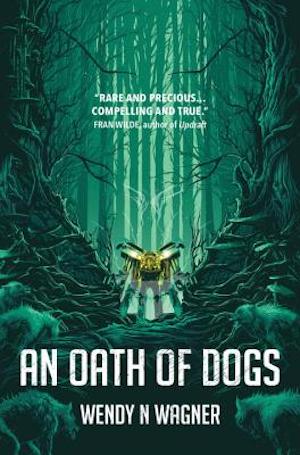
The Songheuser company was gracious enough to offer recovering trauma victim Kate Standish a job in Canaan Lake, on the life-bearing moon Huginn. The trip to Huginn took a year. No problem for Kate or her dog; they spent the year sleeping while the starship made its way from Earth to Huginn. As 2020 showed, a year is not such a long time to spend in suspended animation.
It was, however, sufficient time for Duncan Chambers, Kate’s intended boss on Huginn, to vanish, leaving Kate as Canaan Lake’s new communications manager. Songheuser is focused on the bottom line; they aren’t at all interested in what happened to Duncan Chambers. Kate, on the other hand, is very interested. Her curiosity draws her into the complex affairs of a world about which she was insufficiently briefed.
***
Six Wakes by Mur Lafferty
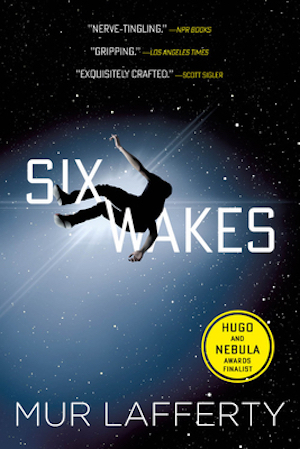
Mitigating climate change on Earth is fine for the little people and their government representatives. The one percent, on the other hand, can simply up sticks and head for Tau Ceti’s pristine world. It may take the Andrews-Zubrin sail ship a century to reach paradise. No problem for the rich, who will sleep the decades away. Running the Dormire is a task left to nobodies, crew successively cloned as need demands.
Twenty-five years into the voyage, Maria Arena’s latest clone wakes. On escaping from her clone pod, she is confronted with a series of disquieting revelations: her predecessor was murdered, along with the rest of the crew. A new set of clones have been activated; like Maria, they are all missing twenty-five years of memories that did not get recorded and passed on. Which is why it remains unclear exactly WHY the Dormire is off-course. Or why someone has reprogrammed the food replicators to produce only poisonous hemlock. Most concerning? Since the ship is three light-years from the nearest human community, the architect of the Dormire’s misfortune must have been on the Dormire…and may still be on board.
***
No doubt you have your own favourites.2 Feel free to mention them in the comments below.
In the words of Wikipedia editor TexasAndroid, prolific book reviewer and perennial Darwin Award nominee James Davis Nicoll is of “questionable notability.” His work has appeared in Publishers Weekly and Romantic Times as well as on his own websites, James Nicoll Reviews and the Aurora finalist Young People Read Old SFF (where he is assisted by editor Karen Lofstrom and web person Adrienne L. Travis). He is a four-time finalist for the Best Fan Writer Hugo Award and is surprisingly flammable.
[1]Note that this essay differs from my recent “Classic SF About Extremely Long Naps” (https://reactormag.com/2021/03/18/classic-sf-about-extremely-long-naps/) in that this is about sleepers who are actively *going somewhere.*
[2]Karl Schroeder’s “Lockstep” seems like it would be a natural fit, but I’ve not read it.










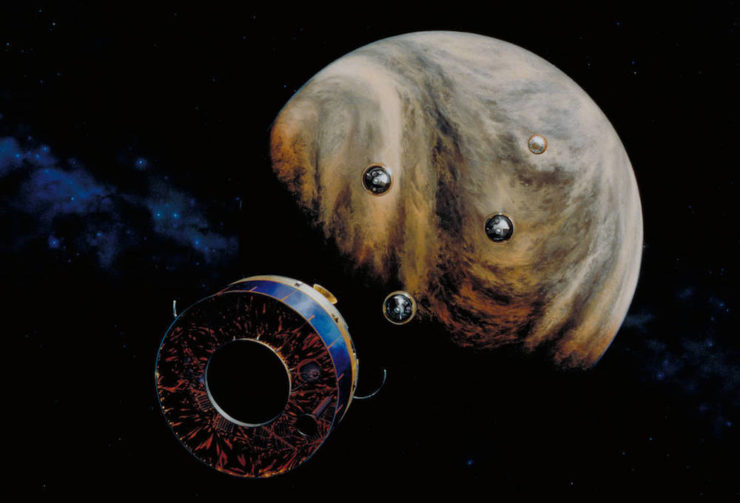
“These trips, true to their Dumarest inspiration, were both inexpensive and had a one in six change of killing the passenger.”
I think the sleeping passengers alluded to in “The Rolling Stones” have a similar death rate (that’s why the twins are discouraged from getting involved in that business (either as customers or suppliers)).
Cold sleep always works out well for the sleepers as seen in Niven and Pournelle’s “Legacy of Heorot. “, Bova’s “Exiles” trilogy, and Frank Herbert’s “Destination Void”.
Other possible contenders: Clarke’s 2001: A Space Odyssey, which highlighted some technical issues, Barton and Capobianco’s Alpha Centauri, whose revival rate was less than a hundred percent despite tardigradeforming the passengers, and Spaceship to Saturn, which surprisingly enough did not as I remember involve sleeper fatalities. Oh, and the Alien franchise is big on hibernation. The novelization suggests FTL drives are about forty times lightspeed (which would make stars an average of about a month and half apart) but I don’t know if that is from the movies or something Foster invented.
The combination of waking crews and sleeping passengers facilitated a bold social experiment in A Gift from Earth (1), in which the descendants of the passengers were used for parts by the descendants of the crew. The crew was able to wake the passengers up one by one to inform them of their exciting new status as serfs/organ donors, disposing of the recalcitrant ones as they went. Well, that seems fair. I did wonder back in the 1970s why the UN used slow boats and cold sleep as opposed to ramjets and stasis fields.
1 https://www.tor.com/2009/09/27/invisible-man-and-organ-banks-larry-nivens-a-gift-from-earth/
And of course Khan Noonen Singh in Star Trek
That was some good cold sleep tech in Trek. The sleeper ship that turned up in Lower Decks didn’t seem to work as well, so go war torn Earth of the 1990s or early 20th century!
Getting back to Niven, there was the plot point in A World Out of Time that the mission to seed Venus-like worlds would take about two hundred years as measured by the Bussard Ramjet. The State equipped the ship with cold sleep facilities, which they claimed would have some regenerative properties. As I recall, this was a lie: the mission was designed to end about the time the pilot was expected to die of old age. How the pilots were expected to react once the lie was exposed is unclear, since for various reasons the mission did not go ahead as planned.
Given that they could upload minds to the ramjet, it’s not clear why they needed a pilot at all.
RE: the one-in-six chance of dying during a Traveller low berth passage. IIRC the game manual mentioned that starships with sketchy crews would have a betting pool on how many passengers survived.
4. Pretty sure that when the colony ship from A Gift From Earth left Earth, stasis fields hadn’t been invented yet.
@6:
Good question. The State may have been a bit paranoid about uploaded (immortal) minds and preferred to put their hugely powerful ships in the hands of people who were mortal.
“Far Centaurus” is my earliest memory of a story that combined cold sleep and STL interstellar travel. There’s FTL by the end of the story, and (sort of) time travel too. Figures; it’s van Vogt.
(I probably watched 2001 as a child before reading “Far Centaurus”, but despite the cold sleep being integral to the plot of 2001, it didn’t make an impression on me until much later.)
As James referenced in the footnote, Karl Schroeder’s Lockstep combines cold sleep and STL travel with the novel idea of making the entire society go into cold sleep, so distant worlds stay in sync and travelers don’t lose any subjective time.
To be honest, a 1 in a thousand chance of dying from cryosleep is too high. One wonders what sort of society would tolerate a 1 in 6 chance of death for folks doing nothing more than traveling on the cheap. If a Low Passage passenger was well connected and famous… how much brouhaha would result from him dying?
Sky’s Edge makes an appearance in several of Alastair Reynolds Revelation Space series, Sky being the captain of a mixed sleeper/generation ship who gains an edge over the other ships in the fleet by dumping cargo overboard…
What makes it so much worse is that among the drugs available to Travellers is Fast:
Granted, a dose of Fast is 2000 cr, and the antidote is another 900, while Low is a cheap 1000 cr + 1/6th the value of the rest of your life. But Fast won’t kill you.
Does the Ark in the Doctor Who story “The Ark in Space” count? It is on a journey, sort of, even though the journey consists of “go round and round the Earth until said planet has cooled down and become habitable again”.
I may have mentioned James White’s The Dream Millennium in a similar context – the thousand-year journey of the sleeper ship in that one does have a defined end point.
The Dream Millennium by James White. Cryogen recapitulates phylogeny (a line that I think is used in the book), and hibernating star travellers dream of their ancestors’ lives, all the way back to trilobites (who aren’t actually ancestors of vertebrates).
There’s a fundamental problem with long-term freezing (as opposed to slowing down): chromosomal radiation damage. This includes damage from carbon-14 incorporated into the genes, so no amount of external shielding will completely solve the problem. A living organism has genetic self-repair mechanisms, but an organism that has had the repairs suspended, while the damage is ongoing, will have some big problems if that went on for a long time.
IMTU (aka In My Traveller Universe) the low berth was only that deadly at the tech level it was introduced (say TL8) and if you had a proper MD on board you got a big bonus to the die roll. If you were wounded or the medic was also a popsicle, well, that’s a different situation.
That said, by TL 10+ it was as safe a way to travel as any. I usually had a 1 in 1000 chance of a revival error even without a doctor.
Not even the 3I was that callous about lives.
@16 – A problem that seldom, if ever, gets taken into account. Peter Watts did in Blindsight, but he’s the only author I can recall doing so. Of course, Watts trained as a biologist.
@13: Sheffield’s “Between the Strokes of Night” has a drug similar to “Fast” (but with a bigger multiplier).
Wouldn’t the one percent up *stakes* and head for Tau Ceti?
Another Traveller example: a few decades before the Solomani discovered FTL, the ESA sent out a flight of hybrid generation/sleeper ships. 2500 years later they found habitable worlds that happened to be a star cluster isolated enough that it was another millennium before the Third Imperium’s jump ships could reach them (still requiring deep space refuelling; Trav does not make it easy to cross rifts.).
@20: there are two idioms, “pull up stakes” (US) and “up sticks” (Commonwealth).
‘An Oath of Dogs’ is an excellent novel and I really enjoyed it, but is is not a book I think of in the sleeper ship genre (if there even is such a thing). I’d have left this out of the list to be honest.
The decision to include Traveller the RPG is an interesting one! We had a copy of that in our gaming society in College that was always going missing.
My two picks would be ‘Chasm City’ by Alastair Reynolds, which is alluded to by Anthony @12.
Second would be ‘Hull Zero Three’ by Greg Bear. Both of these novels are best read cold (I went into them not really reading any reviews or blurbs). They have, for me, become the definitive Sleeper Ship novels.
I have not read ‘The Winds of Gath’, so that gets added to the tbr mountain!
“the game manual mentioned starships with sketchy crews would have a betting pool on how many passengers survived”
The Low Lottery was a customary feature on all ships that had Low passage berths. This does not invalidate your statement, since all Traveller ships could be considered to have sketchy crews.
Ahhh Dumarest of Terra. Old-school trashy sci-fi fun. I have fond memories of going to our rented beach vacation house and discovering a bunch of the Dumarest novels in one of the bedrooms, include Winds of Gath. I was probably a little young for them (11, 12?) but they were an early gateway for me into spec lit. I should try and re-read but afraid it would not be quite the same!
I was a bit surprised when I reread Winds that tough wandering Dumarest is motivated in large part by his concern for other people’s well-being.
Would Blindsight count? The crew of the Theseus has to go in to cold sleep reach their destination.
Vacuum Flowers has cold sleep as a plot point.
Then there’s Jim Cambias’ The Godel Operation where cold sleep is routinely used to get biologicals from place to place.
John Varley’s Golden Globe has cold sleep reserved for the wealthy.
A movie I just saw today on Netflix, “Oxygen”. An amnesiac wakes up trapped in a hibernation pod whose life support is rapidly failing. Figuring out what’s going on is complicated by the fact that every voice we hear INCLUDING the protagonist is an unreliable narrator.
Wikipedia notes a version of “Russian roulette” played with five bullets in the gun.
Oh, to say something about hibernation travel stories… well, “2001” doesn’t have great odds for it…
JDN @@@@@ 26. You do almost tempt me to go to Abe to pick up a few of the Dumarest novels to re-read. Wasn’t there something like an android priesthood that kept coming into conflict with Dumarest? I remember these encounters being very dramatic and thrilling to young pre-teen me!
Worse than Russian Roulette. Due to gravity and physics, if you load the revolver with only one bullet and then spin it, the bullet will most likely land on the bottom and you’ll get a click instead of having your brains splattered out.
It’s not a fair die, is what I’m saying, and your odds of survival, assuming you do only have one bullet in there, are at least a little greater than 5/6.
@23 I had the same thought about An Oath of Dogs – great book, but not really one that leaps to mind for this category.
What about Children of Time? The way we have one character waking up every so often and seeing the mostly not good things happening in the ship is fantastic. The main problem though with CoT is that it is a book that does so many things and does them all exceedingly well. And I guess you can’t feature it in EVERY list!
Andy Weir’s recent Project Hail Mary has coldsleep odds that make Traveller’s Low Passage look wonderfully safe in comparison. And like Six Wakes the ship was also going to Tau Ceti.
I was going to cite ‘The Night of Kadar’ as an example, but in fact the premise is different, albeit an attempt to solve the same problem, with the characters being grown from embryos in vats on reaching their destination. Although this process is highly accelerated, the ship’s AI helpfully provides each embryo with a complete backstory and skill-set so that they’re born ready to embrace their new roles on waking up. Or at least, that’s the plan…..
I haven’t read them in a _long_ time, but I am reminded of some of the Cordwainer Smith short stories: “Think Blue, Count Two”, and “The Lady Who Sailed The Soul” for example.
I collected the first twenty-eight or thirty Dumarest books when I was a kid (because I was a “Traveler” player, and, as observed above, it was source material). My father once ran out of reading material on a family vacation, so I loaned him one of my “Dumarest” books to read. When he handed it back, he commented “I had planned to write science-fiction during my retirement, but now I think I’ll just write pornography instead. There’s not a lot of difference, and pornography is simpler.”
That people might be willing to risk a 1 in 6 death rate while traveling ‘Low’ doesn’t actually strike me as that far-fetched. It compares with the death rate for Irish ‘coffin ships’ traveling to North America (during the worst period, about 1 in 10 Irish immigrants died on the voyage). The mortality rate among African migrants crossing the Mediterranean in 2019 was apparently about 1 in 50. I can well imagine a future in which people would take horrifying risks to try to reach somewhere that they hoped would give them a better life: they did it in the past, they still do it today.
Roger Zelazny’s This Moment of the Storm. The lead cold sleeps his way into the future, in hopes to… Well, read the story. Great stuff.
@20–the usage in the US includes “up stakes” used as a verbal phrase: we will up stakes and move to Tau Ceti. I was originally going to add, “Or is it ‘up sticks’ in Canada?” but I thought that would sound too obnoxious and snarky if it was just a mistake! Thanks for the intercultural help….
@36–ah, but what was the death rate for the Irish who stayed home?
The Third Eagle by RA MacAvoy. Slower than light cyro ships are orphans wandering among planets claimed by younger faster technologies.
In shorter (but memorable) work, there’s Allen Steele’s “The Days Between”, part of his Coyote series, where a cold-sleeper on a centuries long voyage is mistakenly awakened only several decades in, with no way to resume his long sleep.
The Worthing Saga, by O. S. Card. The cold sleep (and an accident during that) is used as a tool to wipe out the memories of the people on a spaceship, which enables a social experiment that aims to figure out if human beings are tabula rasa, if they are internally good or evil. Very ambitions goal and an interesting twist. Disappointingly (and in hindsight, not surprisingly), this didn’t lead further than a mormon-type society. Feels like a missed opportunity for such an powerful premise.
42. ‘Dark City’ (the film, anyhow) has an identical premise. Not sure if they came to any conlusions, either – it’s been a while since I last saw it.
Dragonsdawn, the chronologically-first Dragonriders of Pern novel. Not a focus, but a feature; most of the humans and animals who first colonized Pern were in “cold sleep” for most of the journey there in three big ship.
The 1960s British TV puppet show Space Patrol used sleeper technology for all long-distance flights (e.g. anywhere more distant than Mars or Venus, which only took a couple of days) with robots running the ship until the crew (of three) was defrosted. They never mentioned any problems with survivability, but given it was a kid’s show that isn’t entirely surprising. But at least once their bosses on Earth had to send a signal to have them revived early due to some problem blowing up while they were asleep – they didn’t take shifts for some reason.
https://en.wikipedia.org/wiki/Space_Patrol_(1962_TV_series)
@27 Pilgim
I think if I was to choose a nobel from Peter Watts, I’d go for The Freeze-Frame Revolution where the cold sleep is front and center as a plot point. Now mind you it might be a little short on the going somewhere in a directed way because of the rogue AI running the ship.
@35 See also Cordwainer Smith’s first story, “Scanners Live in Vain,” which, like these, is focused on the physical and emotional toll place on those who must stay awake to pilot ships full of sleepers.
James, #6: Given that they could upload minds to the ramjet, it’s not clear why they needed a pilot at all.
The obvious reason for carrying a human pilot is to keep the uploaded mind/AI running on the ramjet’s computer from going insane due to lack of human contact.After all, they’re the real crew, right?
An honourable mention needs to go to Linda Nagata, who in Vast came up with a brilliant solution to the “crew are uploads, but space is huge and terribly boring” problem. The current duty crew member sits in a virtual flight deck with a big red button in front, and a countdown timer set for 3 minutes. If something anomalous happens, they hit the button: this cancels the timer. Otherwise, if the countdown hits zero, they are overwritten by a fresh copy of themselves. Effectively they experience the flight as a long series of tranches of 180 seconds of nothing, which they repeatedly forget, until it’s time to resume normal life.
@41: Yep. The other year when the ads for a certain movie dropped, I immediately thought “I read this movie already, I found it deeply unpleasant then, and it looks like these clowns have found a way to add some misogyny to it. Hard freaking pass.”
@41, @49: Another story in the same vein is Philip K. Dick’s “I Hope I Shall Arrive Soon”. The traveler in cold sleep awakes mentally but remains suspended physically. The computer tries to keep him sane by playing his memories back to him as experiences. It doesn’t go that well.
@50: The problem I had with the stories in both @41 and @49 is that, in both cases, as soon as the protagonist realized their situation it was morally unforgivable of them to not immediately pull a Lawrence Oates. That does not appear to have been an option available in the Dick story.
#46 vinsentient
Huh. As a big old Watts fanboy, you’d think I’d remember that.
Thank you. And yeah, coldsleep isn’t the focus, but the Chimp is.
I’m reading Weir’s Hail Mary, mentioned earlier. I’m surprised no one has mentioned Hull Zero Three, by Greg Bear. Dark, somewhat gothic, with an opening that might be typical: who am I, where am I, and why is this place going to shit?
@42…Card’s Homecoming Saga is even better. It includes several different uses of the “sleep” to the advantage or disadvantage of the two factions, and for the story after Earth is re-reached. Good stuff.
I would be astounded if Bear had ever encountered it but Hull Zero Three reminded me a lot of a fun little SPI game from Ares Magazine #2: The Wreck of the B.S.M. Pandora. Players recover consciousness on a biological survey ship to learn A: the ship is damaged and will explode if not repaired in a certain number of turns, B: all the specimens got free, and C: Due to mishap-induced short term amnesia, none of the humans remember what any of the animals collected are like. Repairing the ship while fending off alien predators is challenging.
The recent movie Passengers hinges on the fallibility of cryosleep as an inciting incident. I understand why many people criticized the main character’s behaviour (I won’t spoil it if you haven’t seen it), but I also think the movie makes clear this is extreme behaviour under extreme circumstances [like, unless you were there, you likely can’t meaningfully judge the behaviour of an amateur rugby team crashed in the Andes, you know?]
Also, about the only thing I can recall from Songs of Distant Earth was Clarke’s suggestion that long-distance phone calls become free on Jan 1, 2000 as a way of promoting connection and communication between people everywhere. He was seriously over-banking on the largesse of phone companies, and under-estimating that we’d be headed for an “online” communications explosion that would make voice calling become something many avoid where possible within a generation of his proposed date.
In Alastair Reynold’s Revelation Space Universe, the effects of “reefersleep” and the extreme isolation suffered by the Ultras in their lighthugger starships resulted in a transhuman splinter society that was interesting, to say the least.
Vernor Vinge’s A Fire Upon the Deep and A Deepness in the Sky are set wherein a substantial human civilization has been built with hibernation. It is normal for a trader to visit a planet every 200 years or so, noting the changes that have occurred in the meanwhile.
I feel like the short story Starship Day by Ian R. MacLeod deserves a mention here. If you haven’t read it, read it soon.
The last couple seasons of The 100 get into this.
I feel like this quote deserved a sarcasm font.
Back to Earl Dumarest:
I thought I remembered him usually arriving in Low passage, and I thought it was a fifty fifty chance, so the odds of reaching ten books, never mind twenty – !
Yes, recurring antagonists were the Cyclan. Rather like the Borg, mechanical parts, collective mind, want to assimilate everybody. Apart from them I think it’s an all-human universe? And they’re human except for the mechanical bits.
@51: It’s interesting to me that the story I mentioned is “I Hope I Shall Arrive Soon” and the last words of Oates were “I am just going outside and may be some time” …
No one has yet mentioned Andre Norton’s The Stars Are Ours!, where the protagonists escape a world anti-scientific dictatorship in the first interstellar journey using Cold Sleep. Sequel was Star Born, not as thrilling to this then-10-year-old.
BenR @54 – I was annoyed by the “Homecoming Saga” because of a flaw that I’ve seen in others of Card’s series: a fundamental plot point that’s crucial in one book is completely forgotten about a couple of books later, when it would otherwise contradict what he wants to do. In this case, the orbital data systems that give the protagonists their special abilities in the first book or two aren’t needed at the end of the series.
Late to the game, but “Calendars”, by Fred Saberhagen. When $ThatMovie’s (see @41, @49, @50, @51) trailer came out, I was hoping it was an adaption of this, where one of the crew (perhaps, his memory is gone) is wakened early by the ship’s computer and given the task of raising some infants. Except he’s only wakened once a year, while the infants grow up according to the normal (relativistic) passage of time.
Alas, the movie turned out to be its own thing, and disappointing.
#58 @ylee I’m pretty sure you’re talking about Karl Schroeder’s Lockstep and The Million where humans cold sleep away the centuries while their robots make the worlds ready for a brief flourishing of huge numbers of people. Who then go back into cold sleep and travel to another work or await the next flowering.
In the Warhammer universe there’s a planet called Hubris with an extreme orbit. The majority of the population goes into hibernation when the planet swings out of the habitat zone and doesn’t wake up until the planet is habitable again.
“Earthsearch”: a handful of children of what’s meant to be a large generation ship exploring for planets use cold sleep, robots, and wise benevolent AIs to return to their home planet, Earth.
Which is not there.
The moon is, with “First Footprint City”, deserted except for an AI librarian; the system’s other planets remain…
ROT13 detail: Guvf vfa’g bhe fgneflfgrz ol gur jnl, bhef vf jurer va gur raq gurl pbybavfr n cynarg gurl pnyyrq cnenqvfr vafgrnq, ovbybtvpny perqvovyvgl or vtaberq.
Also, in case not yet mentioned, CHILDREN OF TIME, by Tchaikovsky
@64 — The Stars Are Ours was my great favorite as a kid. The depth of time illustrated by the cold-sleep aspect added a lot to my enjoyment.
How about James White’s The Watch Below (1966)? We get not only a sleeper fleet gone awry, but a weirdly parallel generation-ship situation on Earth. (I’ll have to defer to the experts on whether the latter aspect of the story is remotely plausible.)
Rick